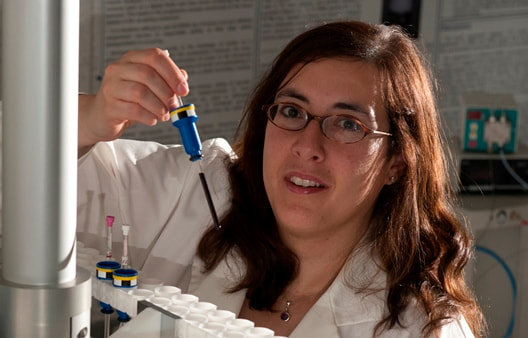AGM and webinar "Molecular biogeochemistry of soil organic matter: Analytical challenges, integrative approaches, and future perspectives"
17:00-18:30, 12th October 2021, online
|
The Environmental Chemistry Interest Group plans to hold its Annual General Meeting online. The AGM will be preceded by a webinar entitled: "Molecular biogeochemistry of soil organic matter: Analytical challenges, integrative approaches, and future perspectives" presented by Prof Myrna J. Simpson who is Canada Research Chair of Integrative Molecular Biogeochemistry and Associate Director of the Environmental NMR Centre, University of Toronto. The webinar will commence at 17.00. The AGM will commence at 18.00. The meeting will finish at aprroximately 18.30.
For registration please visit https://www.rsc.org/events/detail/47669/agm-and-webinar
|
Webinar Synopsis: Soil organic matter is a critical component of terrestrial ecosystems because it is vital for maintaining soil fertility and overall ecosystem health. Soil organic matter is also a major global carbon sink with twice as much carbon in soils compared to carbon dioxide in the atmosphere. However, global environmental change and anthropogenic activities have impacted the intricate balance between soil carbon stored versus respired as carbon dioxide. Globally, soil carbon storage is declining and altering the chemistry of soil organic matter. Soil organic matter is the most chemically active portion of soil (by mass) but how changes in composition will impact overall ecosystem function in the long-term, remain highly uncertain. A major aspect of this uncertainty is due to the complex chemistry of soil organic matter. Soil organic matter is a heterogeneous mixture of compounds from various plant and animal/microbial sources which participate in various biogeochemical reactions in soils. To circumvent these analytical challenges and improve the understanding of soil organic matter chemistry, an integrative molecular-level platform has been developed and uses nuclear magnetic resonance (NMR) spectroscopy along with targeted analysis via gas chromatography-mass spectrometry (GC-MS) to better understand how soil organic matter is impacted with warming, atmospheric nitrogen deposition, and changes in plant detrital inputs. This presentation will provide an overview of these challenges, how these integrative approaches can provide a more informed assessment, and future perspectives on how unravelling the molecular biogeochemistry of soil organic matter is paramount to developing a mechanistic and fundamental understanding of global carbon resources.
Prof. Myrna Simpson is a Tier 1 Canada Research Chair in Integrative Molecular Biogeochemistry and an internationally renowned expert in soil organic matter chemistry. She develops and integrates various analytical approaches to unravel the complexity of soil organic matter composition and uses this platform to investigate soil organic matter biogeochemistry with global environmental change as well as with different land management practices. She co-founded and co-directs the Environmental NMR Centre, the only high field NMR facility solely dedicated to developing novel NMR approaches for environmental research. This Centre is also providing unique, hands-on training to researchers from around the World. Prof. Simpson has published > 200 journal articles and was the lead editor for the 2014 book “NMR spectroscopy: A versatile tool for environmental research”. Prof. Simpson has received numerous awards, including the 2021 RSC Analytical Division Horizon Prize: Sir George Stokes Award(team award for novel analytical developments)
Prof. Myrna Simpson is a Tier 1 Canada Research Chair in Integrative Molecular Biogeochemistry and an internationally renowned expert in soil organic matter chemistry. She develops and integrates various analytical approaches to unravel the complexity of soil organic matter composition and uses this platform to investigate soil organic matter biogeochemistry with global environmental change as well as with different land management practices. She co-founded and co-directs the Environmental NMR Centre, the only high field NMR facility solely dedicated to developing novel NMR approaches for environmental research. This Centre is also providing unique, hands-on training to researchers from around the World. Prof. Simpson has published > 200 journal articles and was the lead editor for the 2014 book “NMR spectroscopy: A versatile tool for environmental research”. Prof. Simpson has received numerous awards, including the 2021 RSC Analytical Division Horizon Prize: Sir George Stokes Award(team award for novel analytical developments)


